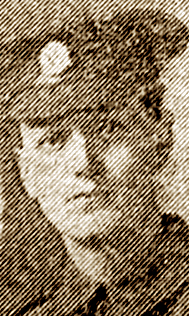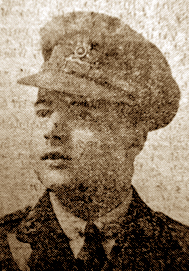Digest of stories from The Luton News: Thursday, June 13th, 1918.
We are pleased to hear that one of our old employees, Pte John Hayden Healey [102086, Notts & Derby (Sherwood Foresters) Regiment], who was well known to people in Luton as he was on our reporting staff in connection with the publication of the Bedfordshire Advertiser, has been awarded the Military Medal for what is described in the official award as “a splendid example”.
 The official account of the act reads: “During the evening of ---- [blanked out] when the enemy put an intense barrage on our lines, communication with headquarters became almost impossible. This man, however, passed through the barrage and kept the company in communication with headquarters although he had been blown up with high explosive and badly shaken. His conduct set a splendid example to the men who were getting very much shaken.”
The official account of the act reads: “During the evening of ---- [blanked out] when the enemy put an intense barrage on our lines, communication with headquarters became almost impossible. This man, however, passed through the barrage and kept the company in communication with headquarters although he had been blown up with high explosive and badly shaken. His conduct set a splendid example to the men who were getting very much shaken.”
In a letter to his parents [grocer and off-licence owner Arthur and Florence Annie Healey, of 31 Court Road, Luton] Pte Healey says the incident in which he was blown up was “really very funny”.
A chum of his who had “a pretty hefty wound” decided it was worth while risking the barrage to get to the aid post, and started about the same time. Part of the journey lay along the same route, but they decided it was no use going together, as it was important that he (Healey) should get along as quickly as possible.
About ten minutes later the high explosive referred to “took a hand in the proceedings” and the next thing Healey remembered was his pal “trying to choke him with the neck of his water bottle”. It was a case of the old fable, but in this instance the tortoise gave the hare refreshment – and lost the race.
[Sadly, John Healey would be killed in action a few weeks later, on July 17th, 1918. He was aged 29, and was buried at Abeele Aerodrome Military Cemetery in Belgium.]
-
Through his death on Tuesday last week after a somewhat lengthy illness, Mr Charles Carrington, tailor, of Cheapside, has lost his son, Pte Charles Henry Carrington, aged 43, of the Beds Regiment, whose wife and four children live in Midland Road. He joined up in the early part of the war but, being unfit for foreign service, had been on service at Ampthill. His illness necessitated his being sent to Cambridge Hospital, but he got no better and was sent home a few days before he died. The funeral on Monday at the General Cemetery, Luton, was marked by military honours, a firing party and trumpeters from Biscot performing the last rites of the Army at the graveside.
-
“
 An honour thoroughly deserved and long overdue,” was his Major's comment on the award of the Military Cross to Second Lieut L. Leslie Hart (pictured right), of the Royal Field Artillery, son of Mr and Mrs G. L. Hart, of The Hawthorns, New Bedford Road, Luton. The award was for his services as liaison on March 21st. Three days after receiving the decoration he was severely gassed and is now convalescing in the Isle of Wight.
An honour thoroughly deserved and long overdue,” was his Major's comment on the award of the Military Cross to Second Lieut L. Leslie Hart (pictured right), of the Royal Field Artillery, son of Mr and Mrs G. L. Hart, of The Hawthorns, New Bedford Road, Luton. The award was for his services as liaison on March 21st. Three days after receiving the decoration he was severely gassed and is now convalescing in the Isle of Wight. -
Letter to the Editor: Sir – Would you be kind enough to appeal to the people of Luton to send us on any of the latest comic songs to amuse the lads at Crowborough Camp, Sussex? There are a good many Luton lads here who would no doubt be obliged to you if you would make an appeal for such songs and others – Pte A. Dean and Pte T. A. Plummer.
-
On Tuesday the Borough Prisoners of War Committee dispatched 60 parcels to prisoners of war. There are now 83 on the books, and the Town Clerk (Hon Secretary) is in communication with regimental depots in respect of ten others, so there are 93 from the borough and immediate neighbourhood.
-
Football enthusiasts will hear with interest that Gunner Ernest Simms, the Town Football Club's centre-forward, arrived at Wardown V.A.D. Hospital on Monday from Shrewsbury. He would have been here a fortnight earlier but for a relapse, and his life was in danger at one time. He is still far from his old self and his hip is troublesome, but he is hoping it will mend speedily. [Simms had been wounded while serving in Italy.]
-
We are informed that Mr Fred Bates, a local trade union leader, has written to the proper authorities asking them to delete his name from all records referring to the Medal of the Order of the British Empire. We understand that Mr Bates has been recommended from several quarters for consideration of the OBE. It will be remembered that he seriously injured in both hands by an explosion in a factory.
-
On Saturday at Chislehurst, the Southern Counties Cross Country Association held one of their series of meetings to encourage running amongst the military. In the five-mile team race run in pairs in thee stages, Bombardiers Morley and Perfrement, of the R.F.A. at Biscot, led the first leg by 70 yards, Bdr Smith and Gnr Hackman kept the lead on the second leg, and Bdr Hart and Bdr Perfrement ran a fine third leg. Hart finished first with a fine sprint, closely followed by Perfrement.
-
Luton's fine new motor fire engine arrived on Monday, being brought from Messrs Dennis' works at Guildford by Chief Officer Andrew. It is really a sister engine to that which Luton hitherto possessed, but there are valuable improvements, including a new type of tyres ensuring a full grip as the engine travels over snow or soft ground. The engine bears the name of the town and the Borough Arms.
-
At the Parish Church of St Mary, Rushden, on Thursday, Miss Jessie May Darnell, daughter of Mr W. H. Darnell, of Lynton House, Rushden, married Charles How Stormer (RAF), third son of Mr John Stormer and the late Mrs Stormer, of Luton. The bridegroom was formerly manager of Messrs Webb Bros, of Rushden.
-
Commencing on Saturday next, the price of the Telegraph will be increased to one penny [from ½d]. The step is necessitated by the paper restrictions which have compelled us to rigidly restrict the size at the expense of our advertising revenue.
-
On the death of Mr Alfred Blundell, of the Manor House, Limbury, his brother Mr Edward Blundell, of Cirencester, took up his residence there. Mrs Edward Blundell, an aged lady, continued to live at Cirencester, but was very desirous of coming to her husband at Limbury. Her infirmity prevented her travelling by train, and motor travelling being prohibited, the family were at a loss to know how to encompass this very great distance. A novel and rather daring idea suggested itself, and during the past few days has been carried out. We understand that a bath chair was obtained and that Mrs Blundell's daughter and an old and faithful servant set out from Cirencester to wheel Mrs Blundell to Limbury by road. They arrived one day last week, having accomplished ten to 12 miles per day, with halts at certain towns each night. The whole journey, which must mean something like 80 miles, is unique, demonstrating the courageous spirit of Mrs Blundell, who concluded the journey in excellent spirits.

